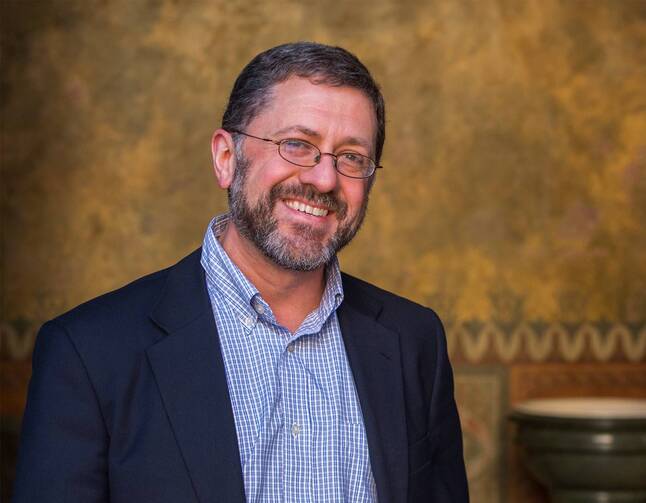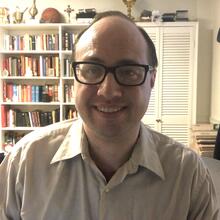Mike Aquilina is an American Catholic author of more than 40 books, including “The Fathers of the Church,” “The Mass of the Early Christians,” and “Roots of the Faith.” Popularizing the study of the Church Fathers, he has hosted nine television series and several documentary films. For many years, he has blogged at FathersOfTheChurch.com on the topic of early Christianity.
Mr. Aquilina currently lives in Pittsburgh with his wife Terri and their children. His latest book, “The Feasts: How the Church Year Forms Us as Catholics,” was co-authored with Cardinal Donald Wuerl and published by Image Books on Sept. 16. On Nov. 3, I interviewed Mr. Aquilina by email about his new book and writing career.
Why did you write this book?
The church forms us in many different ways, and the calendar is one of the most important. Most people, through most of history, couldn’t read. So they didn’t learn the faith from catechisms. They learned it, and they passed it along to their children, through the celebration of the feasts. From the Annunciation through the Ascension, the calendar guides us through the mysteries of Jesus Christ. Woody Allen said that eighty percent of success in life is just showing up. Maybe that’s true even of Christian life.
I remember reading that, in antiquity, as a Jewish boy read from the Torah for the first time, his rabbi would stick a spoonful of honey in his mouth—so the Law would always be a sweet memory. That’s what the feasts do for us. They make the faith memorable, and they make it sweet.
How did co-writing the book with Cardinal Wuerl come about and how did this collaboration work?
I’ve known the cardinal for many years. He’s a dear friend. He was my bishop in Pittsburgh for eighteen years, which is a large chunk of my adult life. We worked together when he was here, and we’ve stayed in touch since he moved to Washington.
The cardinal is a well-known proponent of a back-to-basics approach to catechesis. He’s written several catechisms down the years. For almost twenty years he hosted a weekly TV show that walked through the creed, the Mass, the commandments, and the prayers. A few years ago, the folks at Image Books asked us if we would consider writing a trilogy on the “basics” of Catholic experience: the Mass, the parish church, and the calendar. That was an offer we couldn’t refuse.
Collaboration with Cardinal Wuerl is fairly easy. I begin by going through his personal archives and gathering up the relevant material. He’s been a priest for almost a half-century, and he’s always been a prolific writer. When he was very young, he was Rome correspondent for an American newspaper. He continued writing as a graduate student, then as an academic theologian and a Vatican official, and then as a bishop in three U.S. cities. He’s prepared thousands of homilies, written hundreds of columns, and produced a fair share of addresses and scholarly studies. He also has transcripts of all his years of television shows. Once I’ve gathered the relevant material from his files, he and I work together by meeting, by phone, and by email. It’s pretty easy for me to fill in the blanks.
Who is your audience?
We tried to write for anyone—Catholic or not—who’s curious about the feasts. We give the basic definitions, the historical background and development, the biblical foundations, and we touch upon the customs of many cultures.
You’ve written a good deal on early Christianity. Why focus on the modern liturgical calendar?
It’s not much of a stretch. So many of the feasts have ancient roots. You’ll see the beginnings of a Christian calendar emerging already in the New Testament. We learned how to mark our festivals and seasons from the Apostles and the Church Fathers.
For American Catholics today, life may revolve more around secular schedules of entertainment and work than around the church’s schedule. Why should people “in the world” care about the liturgical year in the midst of all of their other commitments?
The liturgy gives another dimension to ordinary days. The Christian calendar gives a certain momentum to spiritual life, and you can feel the difference it makes. One season presses us to the next; each season resolves the dramatic suspense of the last; and every season is steeped in the mysteries of Jesus Christ. There are no dull days if you’re walking in the company of the saints, whose feasts are ever with us. If you stay tuned to the calendar, you’re growing deeper in your knowledge of history, theology, and culture. If you pay attention to the feasts, you’ll open yourself up to treasures of art, music, and poetry. Life “in the world” is so much richer when lived in light of eternity.
What do you hope readers will take away from this book and from your work in general?
An appreciation for what we’ve all received from the generations of Christians who have gone before us. They’ve preserved the tradition, cultivated it, and passed it on, all at great personal cost. We’re called to do the same.
You studied English at Penn State, but did not start out as a religious writer. What inspired you to write about your Catholic faith?
I was editing publications for a tech company, but going to daily Mass and reading the masters. While on a press check in the mid-1980s I met the editors of Our Sunday Visitor newspaper. We got to talking, and they asked me to write for them. Pretty soon I was moonlighting for a number of Catholic periodicals. Then my bishop—Bishop Wuerl—asked me to edit the diocesan paper.
At every stage I did what seemed like the right thing to do, even though it involved risks and didn’t promise great financial rewards. My wife, whose flaws I have yet to discover, has always been supportive.
You’ve popularized some heady stuff that most Christians don’t read outside of seminaries and universities. What do you say to critics who might object that you don’t have an academic background in theology?
I’ve never claimed to be a scholar. I’m a journalist whose beat is the first five Christian centuries. There’s a lot of genuine curiosity about that period, but the academic material is inaccessible to most ordinary Catholics. And the best scholars are usually too busy doing their jobs to write popular books. I’m utterly dependent upon the work of academic historians; but my task is different from theirs. It pleases me to introduce the Fathers to the rest of the Catholic family. They belong to everybody.
Are you working on any other projects right now?
Indeed I am. In early 2015, I’ll have two new books out, both from Image: Seven Revolutions: How Christianity Changed the World and Can Change It Again, co-authored with James Papandrea, an historian at Garrett Seminary; and The Ancient Path: Old Lessons from the Church Fathers for a New Life Today, co-authored with John Michael Talbot.
With Father Frederick Gruber, a mariologist, I’m writing a book about Marian doctrine and devotion in the early church. We plan to have that in print by the end of 2015.
What’s your favorite liturgical feast and why?
Pentecost. It’s the birthday of the church, and I love the church. I love chapter 2 of the Acts of the Apostles, where we see an explosion of charisms in a church that’s diverse, just emergent, yet already one, holy, truly catholic, and actively apostolic.
What’s your favorite scripture verse and why?
Acts 2:42. It’s the life of my family and my parish—gathered for the teaching of the Apostles and the communion, the breaking of the bread and the prayers.
Do you have any hopes for the future?
I have every hope for the future. My children, aged 11 to 25, are more virtuous than I am, and so are their friends. They’ll do better than I’ve done, and their generation will do better than mine has.
In every generation, all things work together for the good of those who love God. I know all the reasons I’m supposed to be apoplectic about threats to the faith and threats to civilization. But I’ve spent the last twenty years immersed in the story of the conversion of the Greco-Roman world. I know how this story can end.
Any last thoughts?
I hope those are still a few years off. I still have deadlines on the calendar.
Sean Salai, S.J., is a contributing writer at America.







